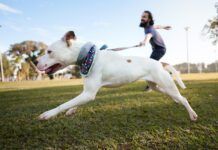I guess I’ll be “outing” myself as a soccer mom with this story, but there is really not much you guys don’t already know about me, so here goes!
My son’s youth soccer league recently began requiring each coach, and a minimum of two parents per team, to attend a three-hour workshop given by the Stanford University-based Positive Coaching Alliance (check out www.positivecoach.org). I was one of the parents who volunteered to go.
The session I attended was held in a local community college lecture hall. I brought a gigantic sized coffee, not sure what to expect but prepared for a boring evening.
However, I was engaged the entire time. The information presented was useful to me not only as a parent/spectator at my son’s soccer games, but also as a dog owner. It was particularly rewarding to learn about concepts that were insightful and relevant to my home and work life!
For example, one of the workshop’s topics had to do with “filling the emotional tank” of child athletes. The leader pointed out that kids with a full emotional tank are far more coachable, able to learn, and likely to perform well than kids whose tanks have been emptied through excessive criticism, corrections, and (just as important) a lack of reinforcement for good efforts. He suggested that parents keep an eye on the “gauge” (“You know when your kid is really quiet and withdrawn after a bad practice? Full or empty?”) and strive to fill their children’s tanks as much as possible when they practice or compete.
The latter task is accomplished (in part) by frequently reinforcing the positive aspects of the child’s effort and performance, and avoiding trying to teach the kid anything in “non-teachable moments” – when you know he’s too upset, distracted, or busy to hear you.
Parents followed the instructor through the talk by filling out a workbook that contained valuable reminders, such as, “Anxiety goes down when self-confidence goes up.” And, “When confident, kids will work harder and stick to it longer.”
Everything presented at the workshop directly correlates to dog training!
Dogs, like kids, also learn best when they are having fun, receive praise for good efforts, and aren’t made to feel like total failures whenever they make a mistake. And who hasn’t seen a dog (maybe your own dog?) stuck in a training session while clearly suffering from an “empty emotional tank” – tail down, ears flat, eyes dull. Not much actual learning gets done in sessions like that.
Unlike me, freelance writer and avid agility competitor Lorie Long has a longtime acquaintance with concepts like these. Check out her article, “Intro to (Sports) Psychology,” in this month’s issue.
-Nancy Kerns




